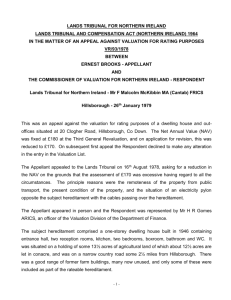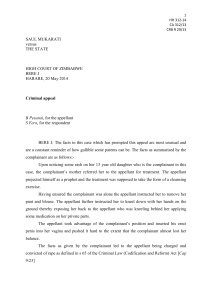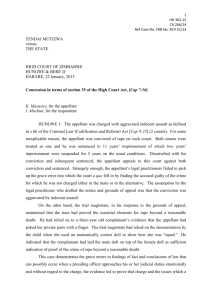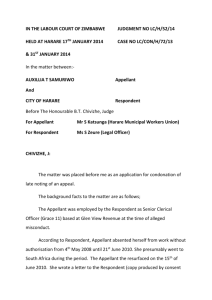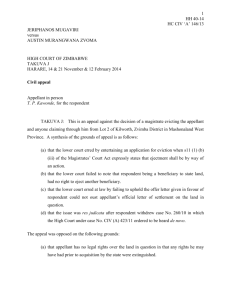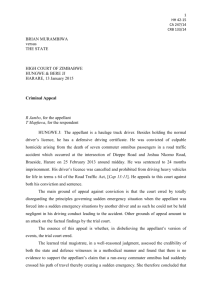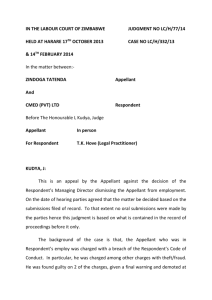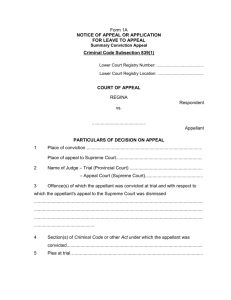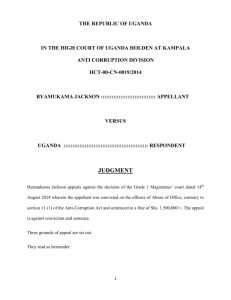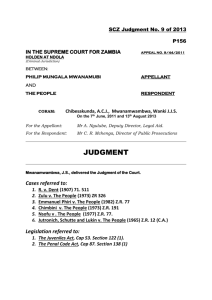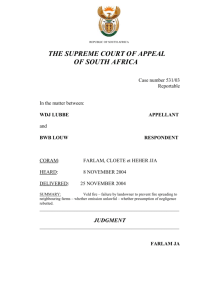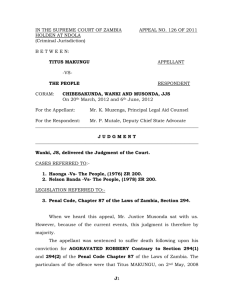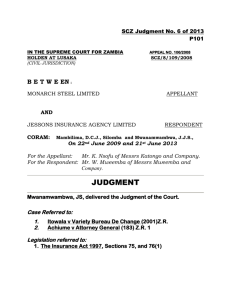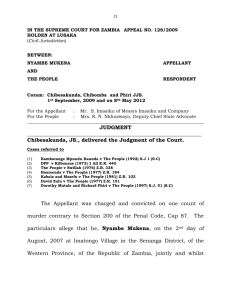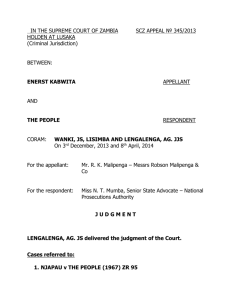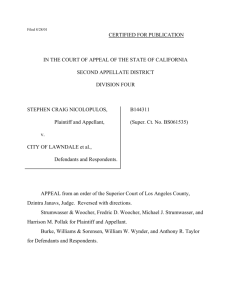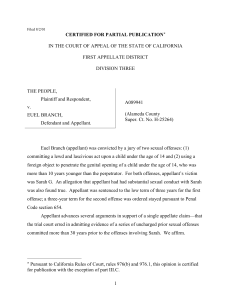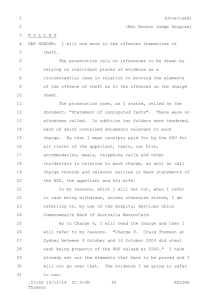MSIMUKO AND PEFILE (1)
advertisement
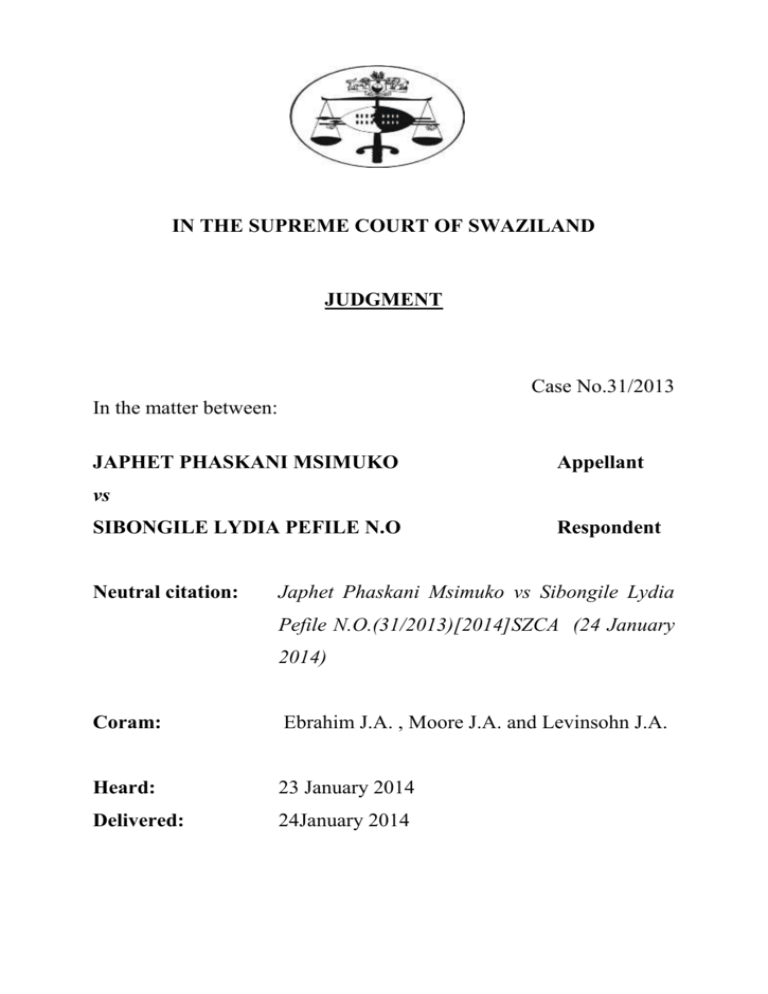
IN THE SUPREME COURT OF SWAZILAND JUDGMENT Case No.31/2013 In the matter between: JAPHET PHASKANI MSIMUKO Appellant vs SIBONGILE LYDIA PEFILE N.O Neutral citation: Respondent Japhet Phaskani Msimuko vs Sibongile Lydia Pefile N.O.(31/2013)[2014]SZCA (24 January 2014) Coram: Ebrahim J.A. , Moore J.A. and Levinsohn J.A. Heard: 23 January 2014 Delivered: 24January 2014 Summary: Sale of immovable property – in terms of oral contract – purchase price paid such contract void and – purchaser unenforceable, taking occupation. Judgment The full Court: [1] This litigation has a rather chequered, and, we may say, unfortunate history. In 1999 one Dr Pefile concluded an oral contract of sale with the present appellant in terms of which Dr Pefile sold and the appellant purchased an immovable property described as Certain remaining extent of Portion 38 of Farm no 75 (Waterford Park) situate in the Hhohho District Swaziland, measuring 5972 square meters for a purchase price of E35000. It is common cause that no written agreement of sale was entered into nor was the requisite consent by the Land Speculation Board in terms of the Land speculation Control Act of 1972 obtained. It follows therefore that undoubtedly the transaction was invalid for want of compliance with the statutory formalities set forth in the Transfer Duty Act of 1903 as well as the abovementioned 1972 Act. [2] Notwithstanding this invalidity the appellant took occupation of the property and paid the full purchase price. According to the evidence the last payment was made in 2001. When this occurred Dr Pefile handed over to the appellant the property title deeds, a rates and income tax clearance certificate. From 1999 to 2007 the appellant and his family occupied the property and paid the various municipal rates and other charges. [3] It appears that from about 2010 the respondent acting as the curatrix bonis of Dr Pefile disputed the appellant’s right to remain in possession of the property and asserted Dr Pefile’s right of ownership thereof. Accordingly, in January 2012 the respondent launched an application before the High court seeking inter alia a declaration that the respondent was the rightful owner of the property as well as the ejectment of the applicant there from. [4] From the papers it emerges that attorney Mr. Simelane who represented the appellant at the hearing before the High Court conceded that the appellant had no defence to the application. In the result the court granted the ejectment order sought. By March 2013 the order had not been put into effect notwithstanding an apparent undertaking by the appellant that he would vacate the property. Instead the appellant lodged an appeal which was out of time. He then proceeded to seek condonation. The matter came before this court in May 2013. condonation was refused. The application for [5] Undaunted by this refusal, the appellant embarked on a new tack. He launched an application claiming firstly, a rescission of the said earlier order for ejectment, and secondly, an order directing the respondent to sign all requisite and /or necessary documents to enable and /or effect transfer and registration of the said property. [6] In a judgment delivered on 22nd August 2013 Mamba J dismissed the application with costs. The learned judge held that the application for rescission based on the provisions of Rule 42 and the common law respectively was without merit. Furthermore he considered that the claim for transfer also fell to be non-suited. The appellant now appeals against this decision. [7] At the outset it is noted that in the heads of argument the Appellant’s legal representative makes the following important concession and I quote: “The appellant is not pursuing the issue of rescission. To be precise appellant concedes that in the ejectment proceedings the High Court was correct in granting the same……..” [8] The gravamen of the appellant’s case before this court is his claim that the respondent be ordered to sign all documents (including a written Deed of Sale) which are necessary to cause transfer of the property to be registered in his name. In effect this is a claim for specific performance of an oral contract where the seller is required to do the necessary in order that transfer can be effected. Registration of transfer in our system of law is carried out by a public official, namely, the Registrar of Deeds. Contractual parties sign the required documents such as transfer duty declarations, powers of attorney and the like, to enable him to do so. [9] The fundamental question herein is whether a party to an invalid contract can be compelled to perform its terms. Moreover, can a party to an oral contract be compelled to sign a written agreement?. Appellant submits that notwithstanding the statutory requirement that a sale of land be in writing the undoubted consensus of the parties to all the necessary terms of the sale somehow breathes life into the transaction. In support the Appellant invokes the principle set forth in Wilken v Kohler 1913 AD 135 and confirmed in Legator McKenna Inc v Shea (143/2008) 2008 ZASCA 144. [10] In the alternative appellant makes the somewhat surprising submission that on a proper interpretation the provisions of section 31 of the Transfer Duty Act are merely directory as opposed to being peremptory. [11] In Wilken v Kohler supra Innes J (as he then was) at page 144 said the following: ..”But that argument surely loses sight of the distinction in principle between setting aside the result of an invalid agreement completely performed, and the enforcement of a term of such agreement alleged to have been disregarded. It by no means follows that because a court cannot enforce a contract which the law says shall have no force, it would therefore be bound to upset the result of such a contract which the parties had carried through in accordance with its terms. Suppose, for example, an unconditional underhand agreement of sale of fixed property for a definite price, a payment of the purchase price and due transfer of the land. Neither party would be able to upset the concluded transaction on the mere ground that the causa stated in the deed of transfer was called a contract of sale, whereas it was in reality an agreement to sell, invalid and unenforceable in law, but which both seller and purchaser proposed to carry out…..” [12] Succinctly stated, the rule provides that, if both parties to an invalid agreement had performed in full, neither party can recover his or her performance purely on the basis that the agreement was invalid. [13] The Wilken v Kohler principle has recently been approved in the Legator McKenna case supra. [14] Quite evidently in the present case the oral contract has not been performed in full since clearly transfer/delivery of the merx sold has not taken place. The appellant’s submissions on the strength of the Wilken v Kohler principle are totally without any substance. [15] I turn finally to the alternative submission outlined above. Section 31 of the Transfer Duty Act No 8 of 1902 provides as follows: “No contract of sale of fixed property shall be of any force or effect unless it is in writing and signed by the parties thereto or their agents duly authorised in writing. “ [16] As the learned judge a quo pointed out this provision is unambiguous and absolutely clear. It is noteworthy that for over one hundred years there have been substantially similar sections in various South African statutes. [17] For example, in Wilken v Kohler supra at 141 Innes J dealt with the Free State Ordinance no 12 of 1906 (wording absolutely identical to Transfer Duty Act above). He said the following: “The trial court held that the effect of these words was to render oral agreements for the sale of such property not void, but merely voidable at the option of either party; that a provision of that nature might be, and in the present case had been, waived by both parties, and that once waived the oral agreement became a contract binding upon each of them. With that view I am unable to agree. The language of the section is perfectly plain; no unwritten contract of the kind referred to is to be of “any force and effect”. Now, a contract which is of no force and effect is void. No emphatic adjectives, and no redundant repetition, could express a conclusion of nullity more effectually than do the simple words which the Legislature has employed. Nor is there any reason why we should refuse to give effect to these plain provisions…” [18] These words written over a century ago by a most distinguished judge are still of application to this very day. Numerous subsequent cases have underlined and reinforced the interpretation of this legislation which is designed to avoid fraud and promote certainty with respect to contracts for the sale of land. I find it unnecessary to burden this judgment by citing any further cases save to mention the Ephraim Toya Twala case decided by the Swaziland High Court in 1994 and cited at page12 of the judgment of the learned judge a quo. [19] In our opinion there is absolutely no merit in the alternative submission and it falls to be rejected. In the result the appeal is dismissed with costs. Signed _________________ A.M. EBRAHIM J.A. JUSTICE OF APPEAL Signed: __________________ S.A. MOORE J.A JUSTICE OF APPEAL Signed: ___________________ P. LEVINSOHN J.A JUSTICE OF APPEAL


